Clearing the way – Routing with Wirtgen Surface Miners to clear the way in rocky terrain
Surface miners from Wirtgen can do much more than just extract pay minerals. When developing the Chisholm Trail Parkway in the US State of Texas, they are used for routing work and reliably bite their way through hard rock.
The sight on a federal highway in Fort Worth, Texas, is certainly unusual: instead of the road building machines that normally dominate the scene, three mining machines are biting their way through the rocky ground. These machines, however, are not mining pay minerals – they are cutting a route, another domain of the surface miners from Wirtgen. The North Texas Tollway Authority (NTTA) is building the 28-mile-long Chisholm Trail Parkway here, a toll road which will in future connect Interstate 30 south of Fort Worth with the U.S. Highway 67 near Cleburne.
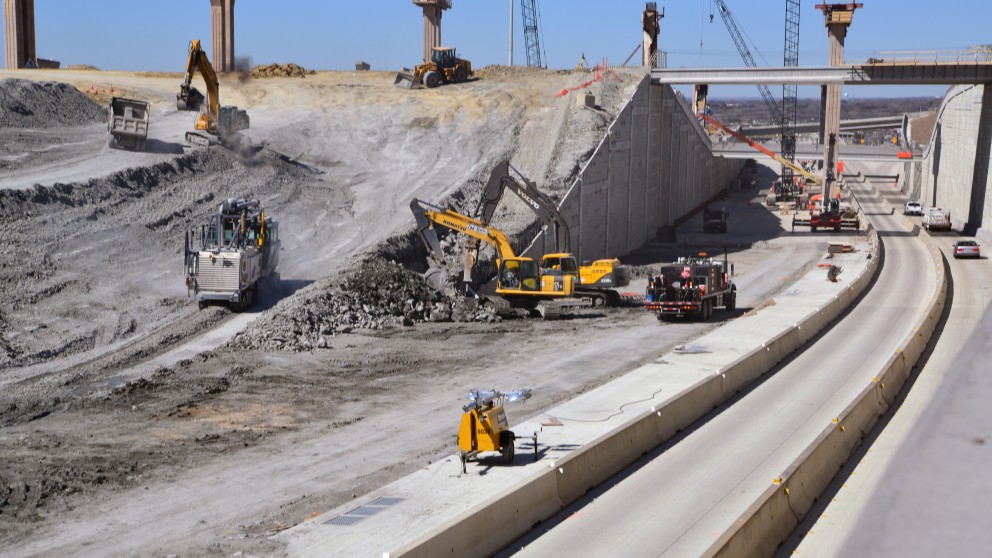
Conditions at the building site in Fort Worth pose enormous challenges to both staff and machines. This is why heavy equipment from the mining sector is used: Wirtgen Surface Miners bite their way through the hardest rock
The NTTA faced two problems when planning the project. For one thing, the planned route ran through exceedingly rocky terrain comprising solid limestone. The other problem was that conventional drilling and blasting methods were not permitted for this project. “We are working inside the city limits of Fort Worth. Drilling and blasting are a thing of the past there and in the nearer environs,” says Mike Manley, Equipment Division Manager, Mario Sinacola & Sons Excavating Inc.
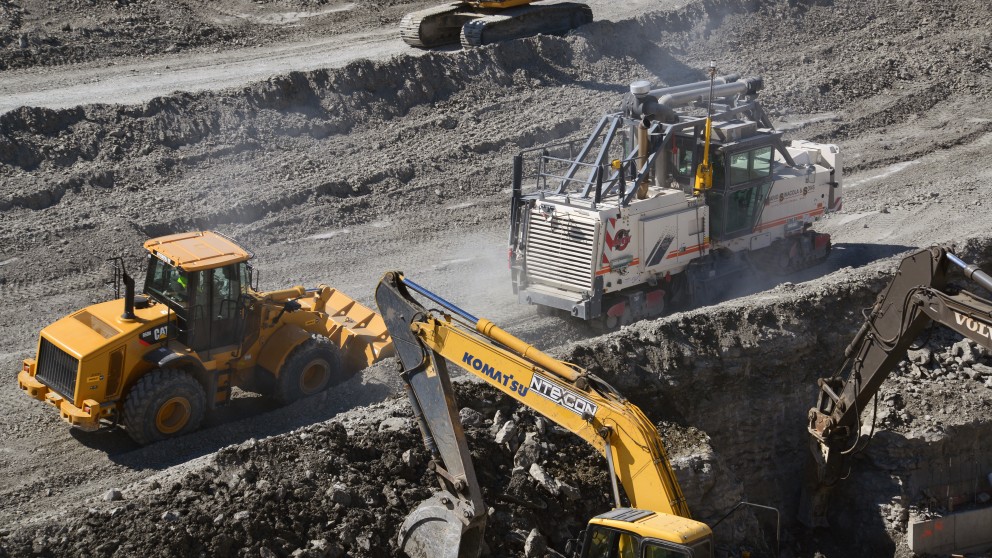
The modular design of the Wirtgen 2200 SM — the smallest surface miner with a working width of 2.20 meters and a cutting depth of up to 30 cm —- is of great practical advantage: the machine can be used as a classic surface miner for mining operations; with few modifications, it can also be used as high performance milling machine for road construction. This guarantees high machine efficiency.
The company contracted to undertake the work, one of the largest general contractors in northern Texas, soon presented a quick, albeit at first glance somewhat unusual solution: why not use surface miners for road building to remove the extremely hard limestone substrate selectively, rapidly and with millimeter precision? In mining business, Mario Sinacola & Sons have already successfully used the machines to mine pay minerals for many years, for Wirtgen surface miners cut, crush and load the material in a single operation. Additional machines are not needed; this considerably reduces the equipment, personnel and time required. Mining, or routing operations as in Fort Worth, can be undertaken more cost-effectively.
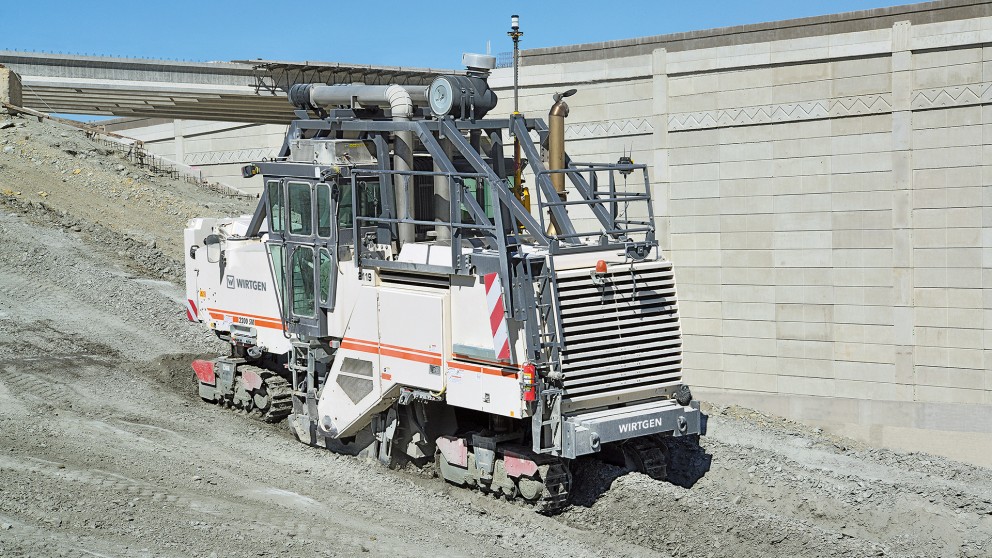
For the ramp construction, the compact 2200 SM was used, with the optimal cutting depth of 25 cm in this terrain. Cut material was disposed in windrows.
“The earth works cover a vast area, the amount of rock to be removed is relatively large and the work very intensive,” explains Chris Logan, Project Manager, Mario Sinacola & Sons. This is also clear from the following figures: 2.14 million cubic meters of limestone with an average hardness of between 6,000 and 10,000 PSI, including some areas with up to 16,000 PSI. “The surface miners are decisive, especially when the dozers come up against their capacity limits. With the help of the surface miners, we can crush the hard rock to the desired grain size and use it directly in situ,” adds Logan. The company‘s Project Administrator Channing D. Santiago adds: “Without the surface miners from Wirtgen, the work would proceed extremely slowly. We would instead have to use pneumatic drills for months on end and incur high costs in the process. Surface miners are the ideal choice for this application.”
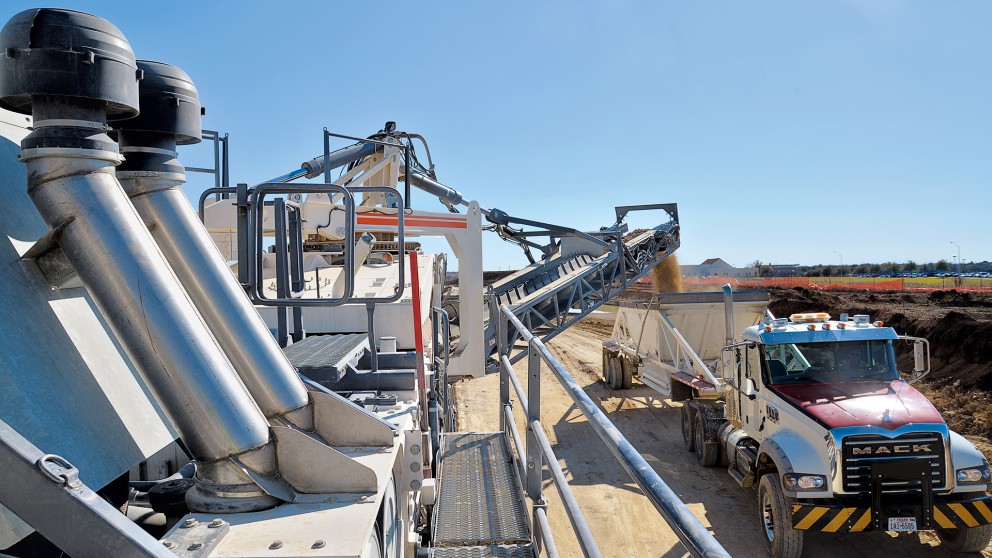
The Wirtgen 2500 SM loads the crushed rock onto a waiting truck in a single pass.
While the surface miner 2500 SM with 1,065 HP and a cutting depth of up to 600 millimeters cuts meter after meter of the main corridor, the two surface miners 2200 SM with a turning radius of just 2.5 meters demonstrate their prowess when routing narrower sections, such as ramps and crossings. “By combining Wirtgen‘s standard grade and slope control system for simple adjustment of the precise cutting depth with an additional GPS-based system, the operator can optimally adapt the cutting process to the profile of the terrain,” says Robert Bauer, the man responsible for the Mining Division at the Wirtgen Group‘s branch Wirtgen America. The unique cutting technology, a core competence of Wirtgen, minimizes wear on the cutting tools, even in hard abrasive material, while simultaneously maintaining a consistently high extraction performance. Santiago also appreciates the advantages of the quick and easy tool change: “No hammers and no pliers are needed, just an extractor and the picks are quickly replaced.”
Sophisticated Wirtgen technology ensures that the planned bottom profile is neatly cut at the predetermined depth; in this way, the route forms an ideal sub-base for the paving courses. Another advantage is that transport trucks can drive over the level surface without causing damage during the entire construction period. In Fort Worth, part of the reclaimed material is reused as a lower base course at a depth of 20 centimeters. On completion, the three-lane road will comprise a 10-centimeter-thick upper base course in addition to the substructure, and a 33-centimeter-thick fully reinforced concrete pavement.
By using surface miners, the contractor ultimately also helps to protect the environment. Ground impacts, noise and dust are considerably reduced when using surface mining instead of removing material with a pneumatic drill and then transferring it to trucks. And since the costs are also lower, customers are increasingly using the surface miners from Wirtgen for road construction, as the example of Mario Sinacola & Sons shows.
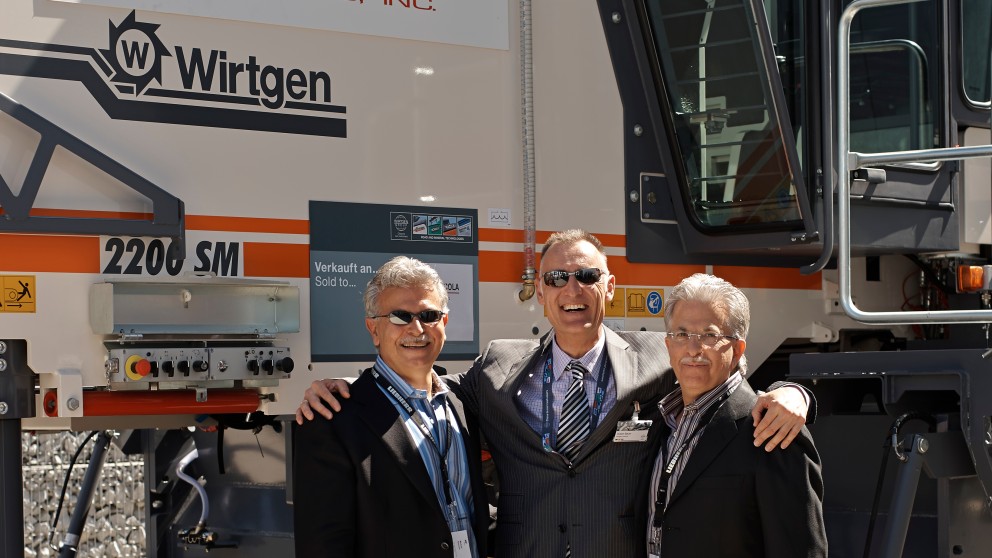
Mario Sinacola & Sons Excavating Inc. increased its machinery buying a Wirtgen Surface Miner 2200 SM at bauma 2013. Michael Sinacola (left) und James Sinacola (right) inspected the machine together with Robert Bauer, Wirtgen America, at the Wirtgen Group booth